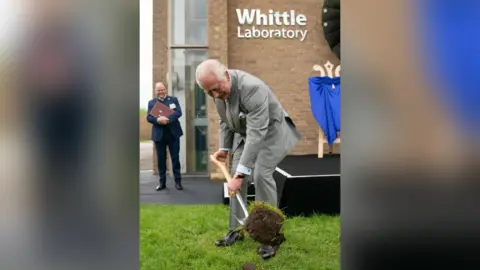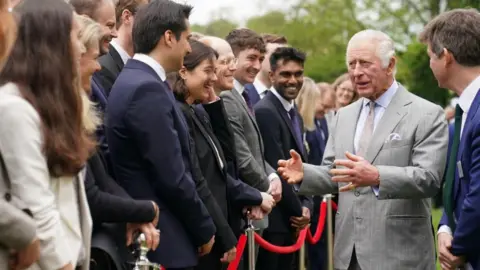King Charles visits site of Cambridge University's £58m net zero laboratory
 PA Media
PA MediaKing Charles III has visited the site where a £58m laboratory will be built to support net zero aviation - for his first official engagement since the Coronation.
The King toured Cambridge University's Whittle Laboratory which recently secured funding for the project.
The lab will aim to halve the amount of time it takes to develop technologies aiming to achieve net zero aviation.
The King performed the ceremonial breaking of the ground.
He also unveiled a plaque and toured the existing laboratory.
 PA Media
PA MediaAs he walked to perform the ceremonial breaking of the ground, where a lump of mud was already visible on the grass, the King joked: "Don't tell me it's already been done?"
He added: "It's very unfair. I was rather looking forward to doing a bit of gardening."
The newly crowned King then dug the spade into the earth, using his foot to help lift a lump of turf, before raising the spade in the air.
He then sunk the spade into the ground, leaving it standing and walked to the stage where he gave a short speech expressing his "enormous admiration" for the work of the laboratory.
It is hoped the new laboratory will become the leading global centre, bringing together experts from research and industry.
The team aims to halve the time it takes to develop key technologies towards net zero aviation and energy, which can typically take six to eight years to reach the point of being considered for commercial use.
Trials at the lab have indicated timeframes could be accelerated by breaking down silos that can exist between academia and industry.
The King has visited the existing laboratory twice before, once in 2020 and again in 2022.
He met leaders from the aviation industry and from government, including Energy Secretary Grant Shapps and science minister George Freeman, before attending a meeting to discuss potential future pathways to a sustainable aviation industry.
During his speech, he said: "I can't tell you what a joy it is to be here, my third visit.
"I think you'll probably be getting fed up of them by now.
"But I really wanted just to express my enormous admiration of what Rob Miller [director of the Whittle Laboratory] is doing here with the Whittle and his remarkable team."
He said their work was needed "urgently in order to save this planet from increasing catastrophe".
"And of course the aviation sector is critical in all this," he added.

Find BBC News: East of England on Facebook, Instagram and Twitter. If you have a story suggestion email eastofenglandnews@bbc.co.uk